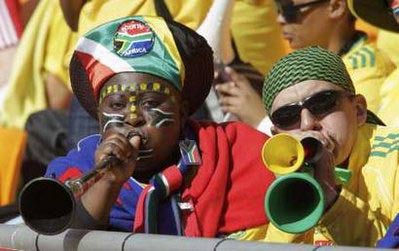 |
|
South African fans blow the "vuvuzela" trumpets before the 2010 World Cup opening match between Mexico and South Africa at Soccer City stadium in Johannesburg June 11, 2010.(Agencies) |
|
South Africa's vuvuzela trumped the Mexican wave in the big match of the day in the stands while Mexico salvaged a late draw against the hosts in the World Cup opening game on Friday. Tens of thousands of fans blasted the plastic trumpet in the match against hosts South Africa, creating a cacophony of sound to spur their team on -- or to simply spar with other supporters. The din was ceaseless throughout the 90 minutes of the match and many kept blowing their instruments through halftime. The only let-up was during the two national anthems before the match. More than 84,000 people were treated to a pulsating first match of the 2010 tournament at Johannesburg's Soccer City, which ended 1-1 amid often deafening noise, and the South Africans want more of the same at their remaining Group A games. "That is our 13th man. It is our weapon," captain Aaron Mokoena said after the match., The trumpet has not been universally well received with some foreign players complaining it drowns out team communication and TV viewers saying the sound, much like a swarm of gigantic bees, is annoying. Dutch coach Bert van Marwijk has banned spectators from blowing them at his team's training sessions. Mexican defender Carlos Salcido was not concerned, though. "It is not a problem. The South Africans were having their party and that's great. We were concentrating and it didn't bother us," he said. On Friday the racket at times seemed almost rhythmical, developing into a contest between different corners of the stadium, and supporters taking turns to outblast the other side. The noise reached a peak in injury time when the home supporters tried, and failed, to push Bafana Bafana to a late winning goal. (Agencies)
|
世界杯揭幕战于本周五打响,虽然墨西哥队在比赛后半段扳回一分,与东道主南非队战平,但赛场看台上南非球迷的(加油长喇叭)“呜呜祖拉”声却赛过了墨西哥球迷的人浪。 在当天墨西哥队与南非队的比赛中,场上数万名球迷吹响了这种声音刺耳的塑料喇叭为球队加油,或者仅仅是为了与其他球迷比赛。 在整场90分钟的比赛中,“呜呜祖拉”发出的嘈杂声不绝于耳,甚至在中场休息期间都不肯停歇,唯一在赛前奏两国国歌时让人清静了会。 本届世界杯令人兴奋的揭幕战在约翰内斯堡的足球城打响,当天共有超过8.4万名球迷到场观战。在比赛现场震耳欲聋的喇叭声中,两队以1比1的比分战平,南非人则希望在A组接下来的比赛中”呜呜祖拉“能吹得更响。 南非队队长阿隆•莫科纳赛后说:“那是我们的第13人,是我们的武器。” 但这种长喇叭并非受到其它国家人的欢迎,一些外国球员抱怨称由于喇叭声太大,他们无法在场上进行交流,电视观众则称场上就像有一群马蜂在嗡嗡乱叫,令人心烦。 荷兰队主教练贝特•范•马尔维克禁止观众在球队训练时吹“呜呜祖拉”。 但墨西哥队后卫卡洛斯•萨尔西则并不介意。 他说:“这没什么。这是南非人在狂欢,是好事。我们集中精力踢球,不会影响到我们。” 在周五的比赛现场,球迷们吹响的“呜呜祖拉”声有时近乎形成了一种节奏,之后体育馆的不同区域还开始了对飚,球迷们轮番上阵,比谁吹得更响。 在伤停补时阶段,“呜呜祖拉”声一度达到了高潮。南非球迷们卖力支持国家球队再进一球赢得比赛,但未能如愿。 相关阅读 (中国日报网英语点津 Julie 编辑蔡姗姗) |
|
Vocabulary: draw:平局,不分胜负 cacophony:harsh discordance of sound; dissonance(刺耳的音调,杂音) din:a loud, confused noise; a continued loud or tumultuous sound; noisy clamor(喧闹) let-up:停止;放松 pulsate:受(激情)震动, 感动; 激动 13th man:每支球队由11名队员组成,球迷常被称为12th man drown out:overwhelm with a louder sound(淹没,压过另一声音) injury time:足球比赛中的伤停补时阶段 Bafana Bafana:南非国家足球队。此语源于南部非洲恩古尼语,指男孩、小伙子,现在成了南非人对国家队的爱称。 |
